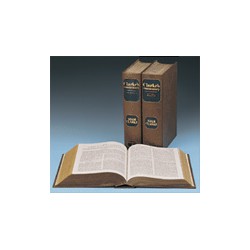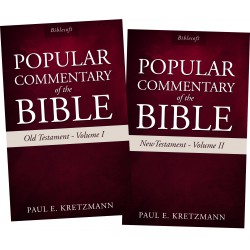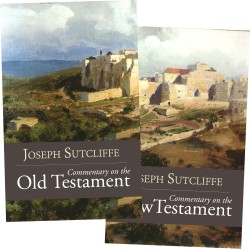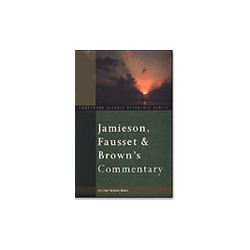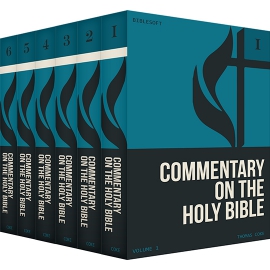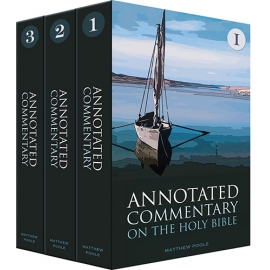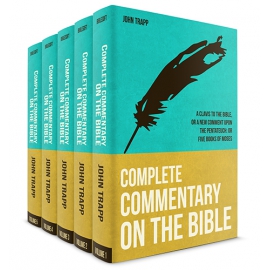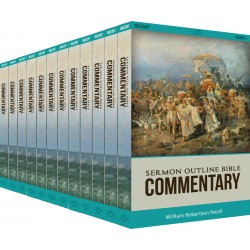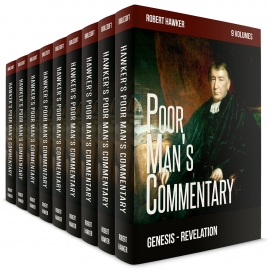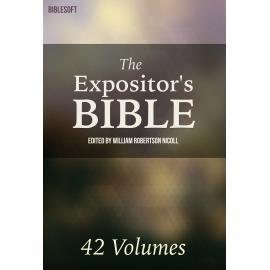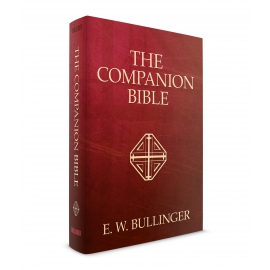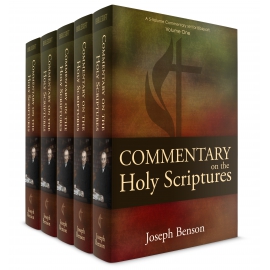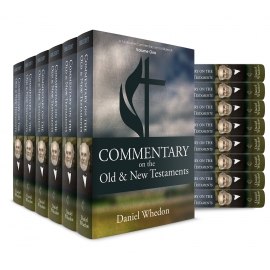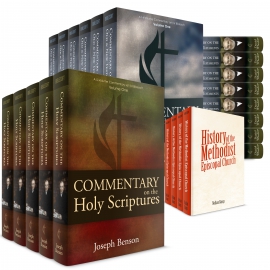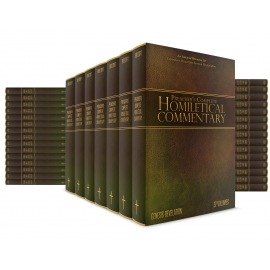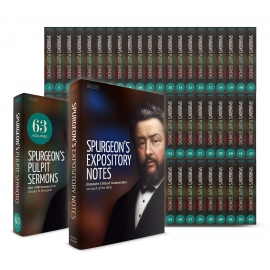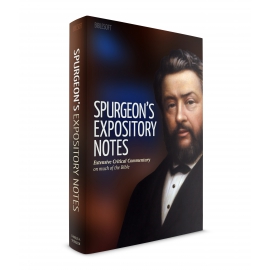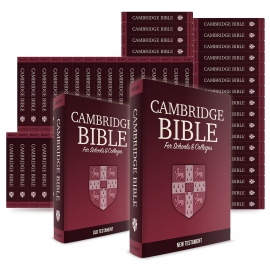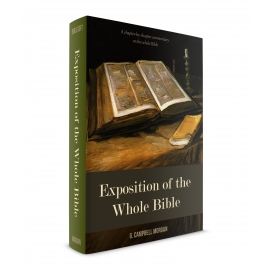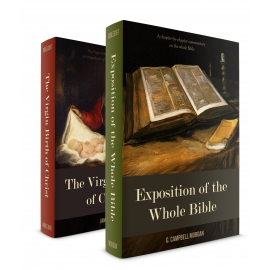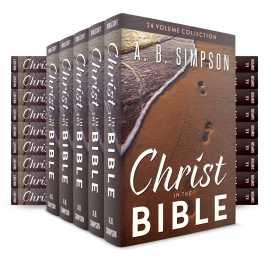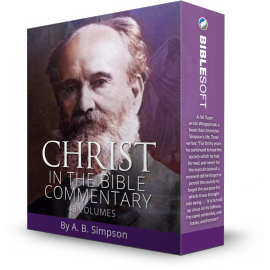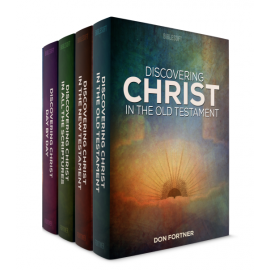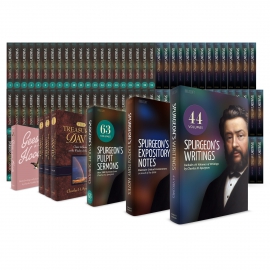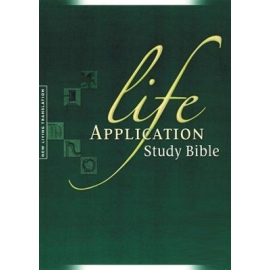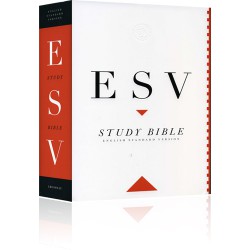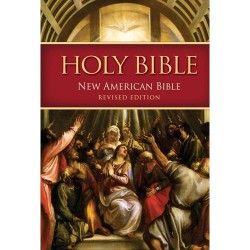No products
Product successfully added to your shopping cart
There are 0 items in your cart. There is 1 item in your cart.
A Bible Commentary for English Readers (8 vols.)
C.J. Ellicott's famous Bible Commentary for English Readers, providing solid expository analysis for the ordinary reader and pastor.
BIBLESOFT DOES NOT SELL EBOOKS
Requires Program PCSB Version 5 or OneTouch (find out more)
- Write a review
Product Information
Ellicott’s A Bible Commentary for English Readers was a Magnum Opus written in his later life. This set of 8 large commentaries by over 20 various authors chosen and edited by Ellicott covers the Old and New Testaments and is done in a style that helps the non-Greek reader yet still delves into solid, expository analysis.
Ellicott explains his objectives for A Bible Commentary for English Readers:
We have at present no Commentary of the New Testament which addresses itself especially to that large and increasing class of cultivated English readers who, believing the Holy Scriptures to be what an ancient writer has defined them to be - "the true sayings of the Holy Ghost" … desire to realize them, and to be able intelligently to apply them to their daily wants and to the general context of life around them. They need one to guide them, who… sets forth to them its ever-fresh truths, its ever new aspects, its ever pertinent and timely consolations. Such is the commentator and such the commentary that is now more than ever needed by the earnest general reader in these days when criticism is constantly trying to rob Scripture of its Divine origin.
Ellicott was himself a brilliant commentator and received high marks from the noted Henry Alford, among others, commending him for his works on Galatians.
Of Ellicott, Vicar Ronald Bayne wrote:
“Until Bishop Lightfoot's works began to appear, Ellicott's commentaries on St. Paul's Epistles were recognized as the best in the English language… Although in his most popular volumes he might seem to stem the tide of modern thought, Ellicott's influence was not reactionary. His courage and honesty forced him continually to the task of correlating old and new views, and his conspicuous candor and courtesy always raised the tone of controversy.”
Of the commentary, Bayne wrote:
“His most important literary labor in the later part of his life was ‘The Old and New Testaments for English Readers,’ which he began to edit in 1878. He collected a strong band of collaborators, including Plumptre and Dr. Sanday. In scholarship and breadth of view the work was much in advance of any previous commentary for general use.”
Screenshots
Excerpt
Psalms
CHAPTER 23
Under two images equally familiar in Hebrew poetry—that of the shepherd watching over his flock, and of the banquet where Jehovah presides over the just—this psalm expresses the tranquility and happiness of those who are conscious of the Divine protection. But, after the Hebrew lyric manner, direct allusions to circumstances mingle with the images. We think therefore of some real person and some actual experience, and not of an allegorical reference to the return of the people of Israel from exile, or of the guidance of the rescued nation from Egypt through the wilderness, which were favourite modes of explanation among the Rabbis. The mention of the house of Jehovah seems decisive against the Davidic authorship, which else it would be fascinating to accept, breathing, as the exquisite verse does, the freshness and beauty of the “sweet singer’s” early shepherd days. The feast, too, under the enemies’ eyes, might have been a reminiscence of Mahanaim; but if David’s fortunes have thus coloured the psalm, it must have been through the mind of some later writer. The rhythm of the poem is as tender as the thought.
(1) Shepherd.—This image, as applied to God, appears in Hebrew literature first (Gen 48:15; 49:24) of his relation to the individual (comp. Ps 119:176); as the shepherd of His people the image is much more frequent (Ps 78:52; 80:1; Isa 40:11; 63:11; Ezek 34; Mic 7:14).
(2) The verbs in these verses are not to be understood as futures, but as presents, describing the customary condition of the poet. “The psalmist describes himself as one of Jehovah’s flock, safe under His care, absolved from all anxieties by the sense of this protection, and gaining from this confidence of safety the leisure to enjoy, without satiety, all the simple pleasures which make up life—the freshness of the meadow, the coolness of the stream. It is the most complete picture of happiness that ever was or can be drawn. It represents that state of mind for which all alike sigh, and the want of which makes life a failure to most; it represents that heaven which is everywhere if we could but enter it, and yet almost nowhere because so few of us can” (Ecce Homo, 5, 6).
Rest, Refreshment, Restoration
He maketh me to lie down in green pastures:
He leadeth me beside the still waters.
He restoreth my soul.—Ps 23:2-3.
1. We are apt to think about the Old Testament as if it were hard and rigid and rugged and severe and stern. Some people say, “I like the New Testament very much, but I do not care to read the Old Testament”; but right in the middle of the Old Testament shines the Twenty-third Psalm, as if it were put there in order that men might never dare to call that book harsh and hard and severe and stern. This Psalm is an outpouring of the soul to God, never matched in all the riches of the Christian day. It is the utterance of a soul absolutely unshaken and perfectly serene. There are times when everything in God’s dealings with us seems to be stern and hard and bitter; then, just as we are ready to cast ourselves away in despair, and feel toward God as toward a ruler whom we can simply fear but never love, there comes some manifestation of God that sets our soul to singing. The hardest and severest passages in the Old Testament find relief if we let the light shine on them from the Twenty-third Psalms [Note: 1 Phillips Brooks, The Spiritual Man, 283.]
2. In the New Testament many of the expressions of deepest faith have their origin in this Psalm. “The Lord is my shepherd, I shall not want.” See how one of the words which afterwards became the inheritance of the race first came to be used. Many words have passed into common use and are now used without any feeling of their sacred origin in the local circumstances out of which the Bible was first written. This is the case with the word “shepherd.” David, the shepherd boy, had been back and forth over the fields of Judæa, and, in the care of those dependent on him, had learned to feel the care of the heavenly Father. It is a beautiful thing when the soul, from its own relationship towards dependent ones, comes to recognize the care of God. Taking up the lamb in his arms, David thought: So my heavenly Father will carry me through all the days of my life. Our Saviour said, “I am the good shepherd.” He took the figure from the Old Testament, and when His disciples came to do the work He had done, the title “shepherd,” or “pastor,” became universal in Christian history. The pastors of the flock are they who try, in their weakness and inability, to do that which Christ did perfectly. David could find no word to describe more fully to his own mind the richness of the care that God had for his life, the absolute dependence of his life upon God’s love, than that taken from his own daily occupation.
I.
Rest
“He maketh me to lie down in green pastures.”
1. The green pastures, says Delitzsch, are pasture-grounds of fresh tender soft grass, where one lies at ease, and rest and enjoyment are combined. The word rendered “pastures” is the plural of a word which is used for a dwelling or homestead. In six of the twelve places where the word occurs, it is coupled with “wilderness”; and in three more it refers to pasturage. It evidently denotes, therefore, the richer, oasis-like spots, where a homestead would be fixed in a generally barren tract of land. We must banish from our minds the green fields of our country, enclosed with hedges or stone walls. In the East the barren uplands are all open and unfenced; and you never see a flock of sheep without the shepherd in charge of them. Everything depends upon the shepherd; he has to find out where the thin grass lurks beneath the rocks, where the precious fountain bubbles into the cistern, where shelter may be had from the scorching sun at noonday.
Some time since I was driving across the Cornish moors, when my friend who was with me pointed to a greener slope between the rocky hills. “My father owned some land here when I was a boy,” said he, “and many a time I have ridden over these moors looking for the sheep; I generally found them on that slope.” “Why there?” I asked. Then he showed me how two high hills rose up and sheltered it from the north and east, and how the slope faced the south, so that they found it warmer, and the early young green grass grew there. Some time afterwards that pleasant picture of the hills happened to come back to my mind, and I turned wondering as to where His flock finds its resting-place. Very beautiful for situation is this Twenty-third Psalm. The Psalm before it begins with that dreadful cry, “My God, my God, why hast thou forsaken me?” Here is the hill of Calvary, with its mocking crowd, “They part my garments among them, and cast lots upon my vesture.” His sheep have come over Calvary; they have passed under the Cross. Behind them rises that hill which for ever breaks the fierce storms that beat upon us. “Being justified by faith, we have peace with God through our Lord Jesus Christ”: here is the calm, and overhead the blue sky where no storms gather. Then immediately after the Twenty-third Psalm comes that which tells of the hill of Zion with its splendours and shouts of triumph. “Lift up your heads, O ye gates; and be ye lift up, ye everlasting doors; and the King of glory shall come in.” So sheltered lies the flock of the Good Shepherd, betwixt Calvary and Heaven, shut in from the angrier blasts, and dwelling in a land that looks towards the sunny south. [Note: M. G. Pearse, in The Sunday Magazine, 1884, p. 605.]
2. Here is a promise, then, to the weary, of repose. Thank God this is not an age of idleness. Can we equally say, Thank God this is not an age of repose? It is almost the prevailing stamp which defines the character of the present day—its restlessness. Call it, if you will, impatience; call it hurry; certainly whatever is the opposite to repose.
We see all sights from pole to pole,
And glance and rush and bustle by,
And never once possess our soul
Before we die.
There is a deep craving within our spiritual nature for a true spiritual rest; not the rest of inactivity or sloth, but a calm, abiding peace, which shall be within us even in the midst of our labour. The full satisfaction of this craving is reserved for the future: “There remaineth a rest for the people of God.” But there are seasons and opportunities of repose vouchsafed to us even now. Resting-days are given us, on which we may gather in our thoughts from the excitement of the world, and receive into our hearts that “peace which passeth understanding.”
There is probably no necessity more imperatively felt by the artist, no test more unfailing of the greatness of artistical treatment, than that of the appearance of repose; yet there is no quality whose semblance in matter is more difficult to define or illustrate. As opposed to passion, change, fulness, or laborious exertion, Repose is the especial and separating characteristic of the eternal mind and power. It is the “I am” of the Creator opposed to the “I become” of all creatures; it is the sign alike of the supreme knowledge which is incapable of surprise, the supreme power which is incapable of labour, the supreme volition which is incapable of change; it is the stillness of the beams of the eternal chambers laid upon the variable waters of ministering creatures. [Note: Ruskin, Modern Painters (Works, iv. 113).]
I began Miss Martineau’s book (Feats on the Fiord) at sunrise, and finished it a little after breakfast-time. It gave me a healthy glow of feeling, a more cheerful view of life. I believe the writer of that book would rejoice that she had soothed and invigorated one day of a wayworn, tired being in his path to the Still Country, where the heaviest-laden lays down his burden at last, and has rest. Yes, thank God! there is rest—many an interval of saddest, sweetest rest—even here, when it seems as if evening breezes from that other land, laden with fragrance, played upon the cheeks and lulled the heart. There are times, even on the stormy sea, when a gentle whisper breathes softly as of heaven, and sends into the soul a dream of ecstasy which can never again wholly die, even amidst the jar and whirl of waking life. How such whispers make the blood stop and the very flesh creep with a sense of mysterious communion! How singularly such moments are the epochs of life—the few points that stand out prominently in the recollection after the flood of years has buried all the rest, as all the low shore disappears, leaving only a few rock-points visible at high tide! [Note: Life and Letters of F. W. Robertson, 204.]
The universal instinct of repose,
The longing for confirmed tranquillity,
Inward and outward; humble, yet sublime:
The life where hope and memory are as one;
Where earth is quiet and her face unchanged
Save by the simplest toil of human hands
Or season’s difference; the immortal Soul
Consistent in self-rule; and heaven revealed
To meditation in that quietness! [Note: Wordsworth, The Excursion.]
3. “He maketh me to lie down.” The first thing that the shepherd does with the sheep in the morning is to make them “lie down in green pastures.” How does he do it? Not by walking them and wearing them out, but by feeding them until they are satisfied. For sheep will go on walking long after they are weary, but the moment they are satisfied they will lie down. It may seem unlikely that early in the morning, as the very first thing in the day, the shepherd should be able to feed his flock so well that they will lie down satisfied. But that depends upon the pastures. If he gets them at once to green pastures, they will of their own accord—their appetites being sharpened by the morning air—eat and be satisfied, and lie down in a great content.
Now a day with the shepherd and his sheep in the uplands is; the life of the believer with God. Its first act is the satisfaction of the soul with the things which He has provided. For the believer of to-day the great provision is the Lord Jesus Christ Himself. And no one who has tasted and seen how gracious the Lord is will deny that the very first experience of the goodness and mercy of God is well described in the first act of the Eastern shepherd’s working-day,—“He maketh me to lie down in green pastures.”
Where dost Thou feed Thy favoured sheep?
O my Beloved, tell me where;
My soul within Thy pastures keep,
And guard me with Thy tender care.
Too prone, alas! to turn aside,
Too prone with alien flocks to stray;
Be Thou my shepherd, Thou my guide,
And lead me in Thy heavenly way.
If thou wouldst know, thou favoured one,
Where soul-refreshing pastures be;
Feed on My words of truth alone,
And walk with those who walk with Me.
I with the contrite spirit dwell;
The broken heart is Mine abode;
Such spikenard yields a fragrant smell,
And such are all the saints of God. [Note: R. T. P. Pope.]
“Lie down and look at it,” a friend once said to me when we were out together for a trip on the Grampians. The scenery around us, I need not say, was strikingly beautiful. There were mountain-tops tipped with snow, hillsides covered with purple heath, green valleys through which flowed the Earn with its tributaries, waving cornfields, and rich pasture lands on which the sheep and deer were feeding in the distance, making a picture which, when once seen, was not to be forgotten. Here and there, too, were ruins of ancient castles, dismantled and dilapidated, carrying one’s thoughts back to the realm of history, and reminding one of times when might was right and those quiet glens were the scenes of war and bloodshed.
But my companion kept on calling my attention to shades of green in the fields, shades of purple on the moors, shades of blue in the sky. He was evidently absorbed in the picturesqueness of the scenery. At last I said to him, “You have got the painter’s eye, and I have not; you can see a beauty in this landscape which altogether escapes me.” “Well, perhaps so,” he said, “but at all events I want to give you the painter’s eye; just lie down and look at it.” And never till that moment had I been conscious of the amazing difference which a slight change of attitude can effect in viewing the fields of Nature. Everything changed with the posture and the standpoint. I now understood, for the first time, the mystic charm which mountain scenery has for the poet’s and the painter’s eye; the ever-changing tints and shades of colour, in earth and sea and sky, transferred with such subtle power to the canvas, and fixed there, “a thing of beauty” and “a joy for ever.” All this I had learnt by following my comrade’s injunction—he made me to lie down in green pastures. [Note: R. Balgarnie.]
(1) The first essential of this rest is an assurance of safety.—The stranger startles the flock, the watch-dog frightens it, the howl of the wild beast scatters it in panting terror. The confidence of the first line is the key to all the gladness of the Psalm—“The Lord is my shepherd.” The whole song is born of assurance. Fear strikes all dumb, as when the hawk wheels overhead in the blue heavens and hushes instantly the music of the groves. Doubt spoils it all—“the little rift within the lute.” Confidence, steadfast, unwavering confidence, is the very heart of this rest. There must be a great, deep, abiding conviction wrought into me that He is mine, and I am His.
What if one who calls himself my friend should ask me to his house, and welcome me with many words, and entertain me with sumptuous show of hospitality, and give me a thousand tokens of his regard. He bids me make myself at home, and hopes I shall be comfortable; but as I am going to rest, he takes me aside. “This is a pleasant house, isn’t it?” “Very, indeed,” say I “most pleasant. The design and arrangements are perfect, the views are charming, the gardens delightful; everything is complete.” “I am glad you like it; I hope you will rest well”; and then his voice sinks to a whisper—“but there is just one thing I ought to mention, we are not quite sure about the foundations.” “Then, sir,” I say indignantly, “you may depend upon it I am not going to stay here.” Sleep! I couldn’t. Why, the man’s welcome to the place is cruel; the entertainment is a hideous mockery; the decorations and furniture are a madman’s folly. No; give me some poor cottage with many discomforts, but where I do know that the foundations are right, and I should be much better off. [Note: M. G. Pearse, in The Sunday Magazine, 1884, p. 606.]
(2) The next thing is satisfaction.—God becomes the answer to all our longings, the fulfilment of all our hopes. He fathoms and fills the uttermost deeps of our being. Our souls lie back on Him and are satisfied—abundantly satisfied, finding in Him their being’s end and aim. God made the soul for Himself; He has begotten within it a thirst that all the waters of time can never quench. This thirst, rightly interpreted, is the grand distinctive mark of our high origin—the prophecy of our return to God.
The Psalm at this point reflects the comfort and peace of those happy souls who, in early life, have tasted and seen that God is good. Satisfied in the morning with His mercy, they rejoice and are glad all their days. To make an ideal beginning of our life we must go with the Good Shepherd early and spend the dewy morn with Him upon the meadows of His grace. For then the spiritual appetite is keen and the heart feeds hungrily on the fat pastures of God’s love until it is nourished into a deep content. There are no lives that dwell in such a profundity of peace or hold within them such reserve and resource of spiritual power as those who can say, “Thou hast been my God from my youth.”
(from Ellicott's Commentary for English Readers. Biblesoft Formatted Electronic Database Copyright © 2014 by Biblesoft, Inc. All rights reserved.)
Product Details














